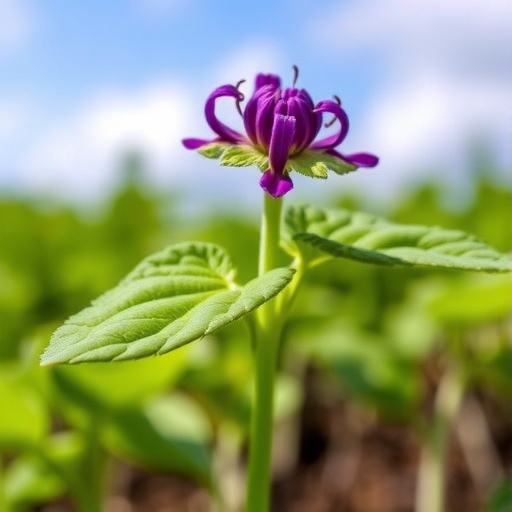In the latest groundbreaking research published in BMC Genomics, a team of scientists led by S. Han, Z. Chen, and Q. Liu have unveiled the intricacies of the plant sulfotransferase family, a group of enzymes that play a significant role in various biochemical processes within plants. The study, which focuses on the identification and evolutionary trajectories of sulfotransferases across different plant species, has far-reaching implications not just for plant biology but also for agriculture and biotechnology.
Sulfotransferases are pivotal in the sulfation of various biomolecules. This biochemical modification is crucial for regulating plant hormone activity, detoxifying harmful compounds, and facilitating the transport of secondary metabolites. By elucidating the evolutionary history and functional diversity of these enzymes, the research team aims to provide insights that could lead to enhanced crop resilience and productivity in the face of climate change and other environmental stresses.
The research methodically catalogs the sulfotransferase genes from a wide array of plant species, ranging from model organisms like Arabidopsis thaliana to economically important crops such as soybean and rice. The comprehensive gene sequencing and comparative genomics analyses reveal that these enzymes have undergone significant diversification over millions of years. This diversification likely correlates with the adaptive strategies that various plant lineages have employed in response to distinct environmental pressures.
Intriguingly, the study highlights that the plant sulfotransferase family has not only expanded in number but has also evolved novel functions. This finding challenges previously held assumptions that the functional roles of these enzymes are largely conserved across species. The researchers present compelling evidence of lineage-specific adaptations, suggesting that certain sulfotransferases have acquired unique functions that contribute to the ecological success of diverse plant species.
Moreover, the researchers utilized advanced bioinformatic tools and phylogenetic analysis to trace the evolutionary relationships among sulfotransferase genes. Their findings indicate that gene duplication events—driven by both whole-genome duplications and localized duplications—have significantly shaped the evolution of this enzyme family. This increased gene copying not only introduces redundancy in biological pathways but also provides a reservoir for novel functions to emerge, thereby enhancing the adaptability of plants.
One of the most compelling aspects of the study is its discussion on sulfotransferases and their implications for plant stress responses. The researchers found that specific sulfotransferases are upregulated under stress conditions such as drought and salinity. This upregulation indicates a potential role in modulating stress responses by modifying hormones like auxins and cytokinins, which are crucial for plant growth and development. Such insights could lead to the development of genetic engineering strategies aimed at enhancing stress tolerance in crops.
The team’s research also delves into the regulatory networks that control sulfotransferase expression. By utilizing transcriptomic analyses, the study uncovers the complex interplay between environmental factors and gene regulation. Understanding these regulatory mechanisms is essential for developing enhanced agricultural practices aimed at optimizing crop performance under varying environmental conditions.
As the implications of their findings continue to resonate, the research holds promise for agricultural biotechnology. The ability to manipulate sulfotransferase activity could have profound effects on crop yield and resilience. For instance, targeting specific sulfotransferase genes could allow scientists to engineer crops that not only grow faster but are also more resistant to pests and diseases.
Another novel aspect of the research is the authors’ exploration of sulfotransferase interactions with other metabolic pathways. They posit that these enzymes are integral nodes in broader metabolic networks, influencing not only hormone signaling but also the synthesis of secondary metabolites. This interconnectedness highlights the potential of sulfotransferases as targets for bioengineering strategies aimed at improving both the nutritional quality and marketability of crops.
As the research gains traction, it has already ignited interest among the scientific community and agricultural stakeholders alike. The implications of being able to enhance plant resilience and productivity through a deeper understanding of sulfotransferases could drive future research directions. The hopeful prospect of developing climate-resilient crops is particularly timely given the pressing challenges posed by global climate change.
In conclusion, the study conducted by Han, Chen, and Liu represents a significant advancement in our understanding of plant sulfotransferases. By uncovering the evolutionary history and functional diversity of these enzymes, the research paves the way for future innovations in agriculture that could ultimately contribute to global food security. This pioneering work underscores the importance of integrating evolutionary biology and molecular genetics to unlock the secrets of plant adaptation and resilience.
The research findings not only push the boundaries of current knowledge but also set a foundation for ongoing investigations into the complexities of plant biochemistry. As researchers continue to unravel the mysteries of plant sulfotransferases, the prospects for enhancing sustainable agricultural practices remain promising.
Understanding the intricacies of plant biochemical pathways through studies like these is crucial as the global community grapples with environmental challenges. The efforts to harness the potential of sulfotransferases may one day lead to breakthroughs that create a more sustainable future for agricultural practices worldwide.
In summary, the identification and exploration of the plant sulfotransferase family, as detailed in this study, hold potential breakthroughs for improving the resilience and productivity of crops, ultimately benefiting both the environment and global food supply chains.
Subject of Research: Plant sulfotransferase family
Article Title: Identification and evolution of the plant sulfotransferase family.
Article References: Han, S., Chen, Z., Liu, Q. et al. Identification and evolution of the plant sulfotransferase family. BMC Genomics 26, 895 (2025). https://doi.org/10.1186/s12864-025-12117-4
Image Credits: AI Generated
DOI:
Keywords: Plant biology, sulfotransferases, evolution, crop resilience, gene regulation.
Tags: biochemical processes in plantscomparative genomics in plant biologycrop resilience and productivitydetoxification in plantseconomic importance of soybean and riceevolutionary trajectories of sulfotransferasesgene sequencing in plant speciesimpact of climate change on agricultureinsights for biotechnology applicationsplant sulfotransferase familyregulation of plant hormone activitytransport of secondary metabolites





